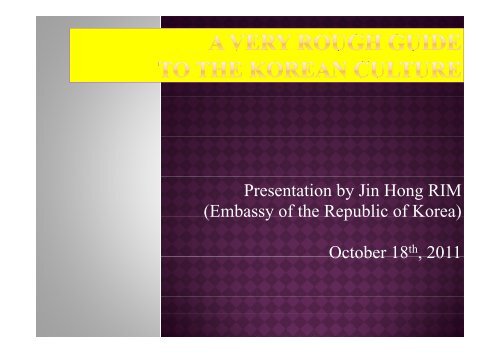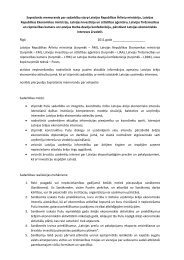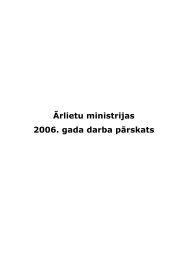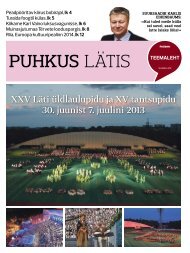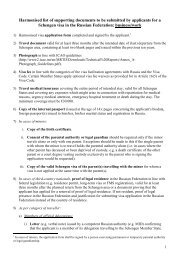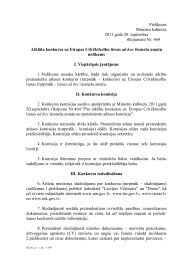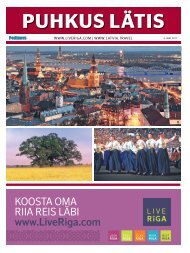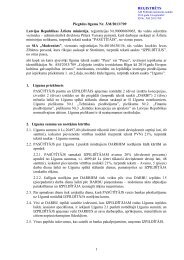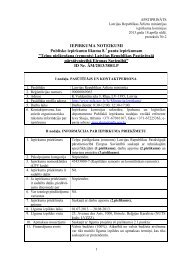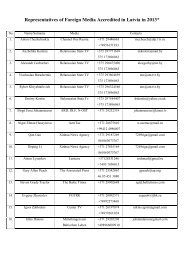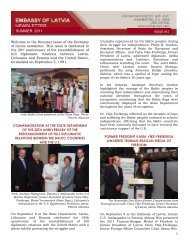Presentation by Jin Hong RIM (Embassy of the Republic of Korea ...
Presentation by Jin Hong RIM (Embassy of the Republic of Korea ...
Presentation by Jin Hong RIM (Embassy of the Republic of Korea ...
Create successful ePaper yourself
Turn your PDF publications into a flip-book with our unique Google optimized e-Paper software.
<strong>Presentation</strong> <strong>by</strong> <strong>Jin</strong> <strong>Hong</strong> <strong>RIM</strong><br />
(<strong>Embassy</strong> <strong>of</strong> <strong>the</strong> <strong>Republic</strong> <strong>of</strong> <strong>Korea</strong>)<br />
October 18 th , 2011
Surrounded d <strong>by</strong> big powers<br />
At <strong>the</strong> crossroads <strong>of</strong><br />
continental and maritime civilizations<br />
Culturally speaking,<br />
Wild love for singing g and dancing,<br />
maybe as a way to release tension and stress<br />
coming from adverse conditions
<strong>Korea</strong><br />
Latvia<br />
Population Roughly 50 million Roughly 2.2 million<br />
Area (land) Roughly 100,000 sq km Roughly 62,000 sq km<br />
Capital<br />
Ethnic<br />
Seoul in and around<br />
(roughly 12 million)<br />
Riga<br />
ethnically homogeneous<br />
(Language spoken)<br />
and speaking<br />
composition<br />
<strong>the</strong> same language Latvians 58%<br />
(Language) Russians 38%
Historically, China has regarded itself as <strong>the</strong><br />
center <strong>of</strong> <strong>the</strong> world, as its name, ‘<strong>the</strong> Middle<br />
Kingdom’ suggests.<br />
Its culture is one <strong>of</strong> <strong>the</strong> world’s oldest and<br />
most complex and has exerted strong<br />
influence all over East Asia and beyond…<br />
Confucianism, classical Chinese …
Japan has been usually on <strong>the</strong> receiving end <strong>of</strong><br />
<strong>the</strong> culture, originating from <strong>the</strong> continent, such<br />
as Buddhism, Chinese characters, and crafts.<br />
<br />
<strong>Korea</strong>, being located at <strong>the</strong> crossroads, has<br />
always served as a cultural bridge in East Asia.<br />
<strong>Korea</strong>’s location has given <strong>the</strong> country a unique<br />
cultural advantage but at <strong>the</strong> same time,<br />
made itself vulnerable to invasions from<br />
neighbors. (on <strong>the</strong> next page!)
Massive Chinese invasions in early yperiod<br />
Mongolian invasion in early 13 th century<br />
A pair <strong>of</strong> Japanese invasions in late 16<br />
th century<br />
Manchurian invasion in early 17 th Century<br />
Annexed <strong>by</strong> Japan from 1910~1945<br />
1945<br />
The division <strong>of</strong> <strong>Korea</strong> and <strong>the</strong> <strong>Korea</strong>n war
Model Confucius State<br />
- Respect for elders<br />
(as reflected in honorifics)<br />
( )<br />
- Hierarchical social structure<br />
- Group-oriented<br />
- Group-oriented<br />
(harmony over individual tastes)<br />
A i i f d bili<br />
- Aspiration for upward mobility<br />
through education
What is honorifics<br />
An honorific is a word or expression<br />
showing respect to <strong>the</strong> person you are<br />
speaking to. (or to <strong>the</strong> third person)
What is honorifics<br />
<strong>Korea</strong>n also has anti-honorific first<br />
person forms ("your most humble servant“)<br />
whose effect is to enhance <strong>the</strong> relative<br />
honor accorded a second or third person.
Using honorifics is mandatory in formal<br />
and informal social settings<br />
<strong>Korea</strong>ns identify <strong>the</strong>mselves in relation<br />
to <strong>the</strong> relative position <strong>of</strong> <strong>the</strong> person<br />
that <strong>the</strong>y talk to or refer to and <strong>the</strong>ir<br />
language changes accordingly.<br />
(depending on <strong>the</strong> person’s age or status)
Hierarchical social structure
Model Confucius State<br />
- Group-oriented<br />
(harmony over individuals)<br />
id - Aspiration for upward mobility<br />
through education
36 years <strong>of</strong> colonial experience<br />
(1910~1945) <strong>by</strong> Japan<br />
and 3-year long civil war (1950~53),<br />
left <strong>Korea</strong> in total ruins<br />
With hard work and education,<br />
<strong>Korea</strong> has managed to stand back<br />
on its feet and is now a member <strong>of</strong> G20.
After <strong>the</strong> <strong>Korea</strong>n War, <strong>Korea</strong> had to start<br />
from scratch and set out on breathtaking<br />
industrialization from early 1960s<br />
Starting from 1980, <strong>Korea</strong>n began to enjoy<br />
<strong>the</strong> fruits <strong>of</strong> rapid economic growth<br />
to afford leisure and entertainment.
It was American and European pop culture<br />
that dominated <strong>the</strong> scene in 1980s.<br />
Things began to change mid 1990s and<br />
people started looking for entertainment<br />
with domestic content made in <strong>Korea</strong>.<br />
By 2006, <strong>Korea</strong> became one <strong>of</strong> <strong>the</strong> handful<br />
nations that consume more locally yproduced<br />
cultural content than foreign content.
It started t with popular music and movies and<br />
<strong>the</strong>n TV dramas.<br />
There genres <strong>of</strong> popular culture<br />
made a splash in Japan and China and <strong>the</strong>n<br />
went beyond East Asia and all over <strong>the</strong> world.
Thank you for your attention.<br />
You may raise any question….
<strong>Jin</strong> <strong>Hong</strong> <strong>RIM</strong><br />
<strong>Embassy</strong> <strong>of</strong> <strong>the</strong> <strong>Republic</strong> <strong>of</strong> <strong>Korea</strong><br />
jhrim_1966@yahoo.co.kr


